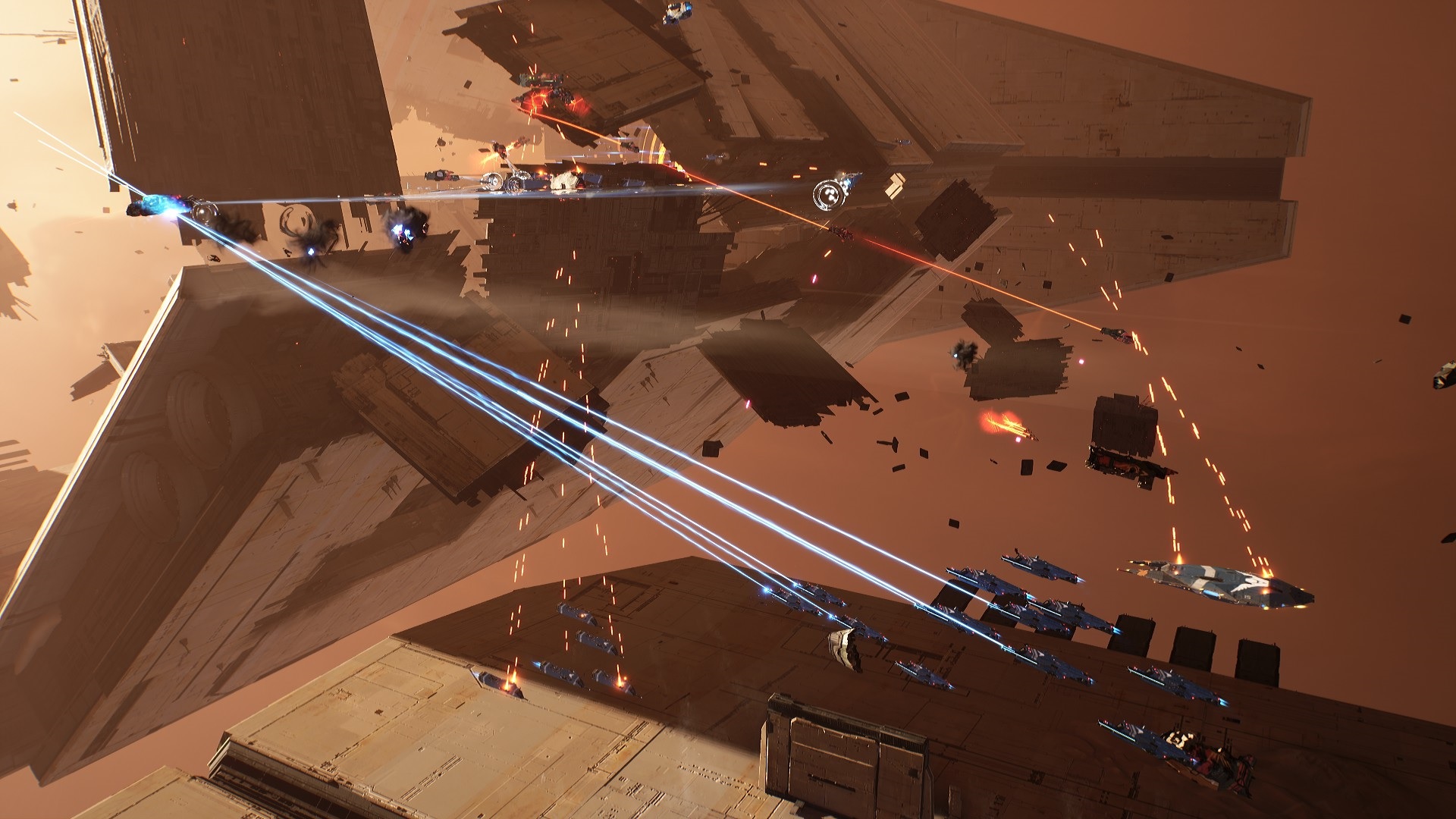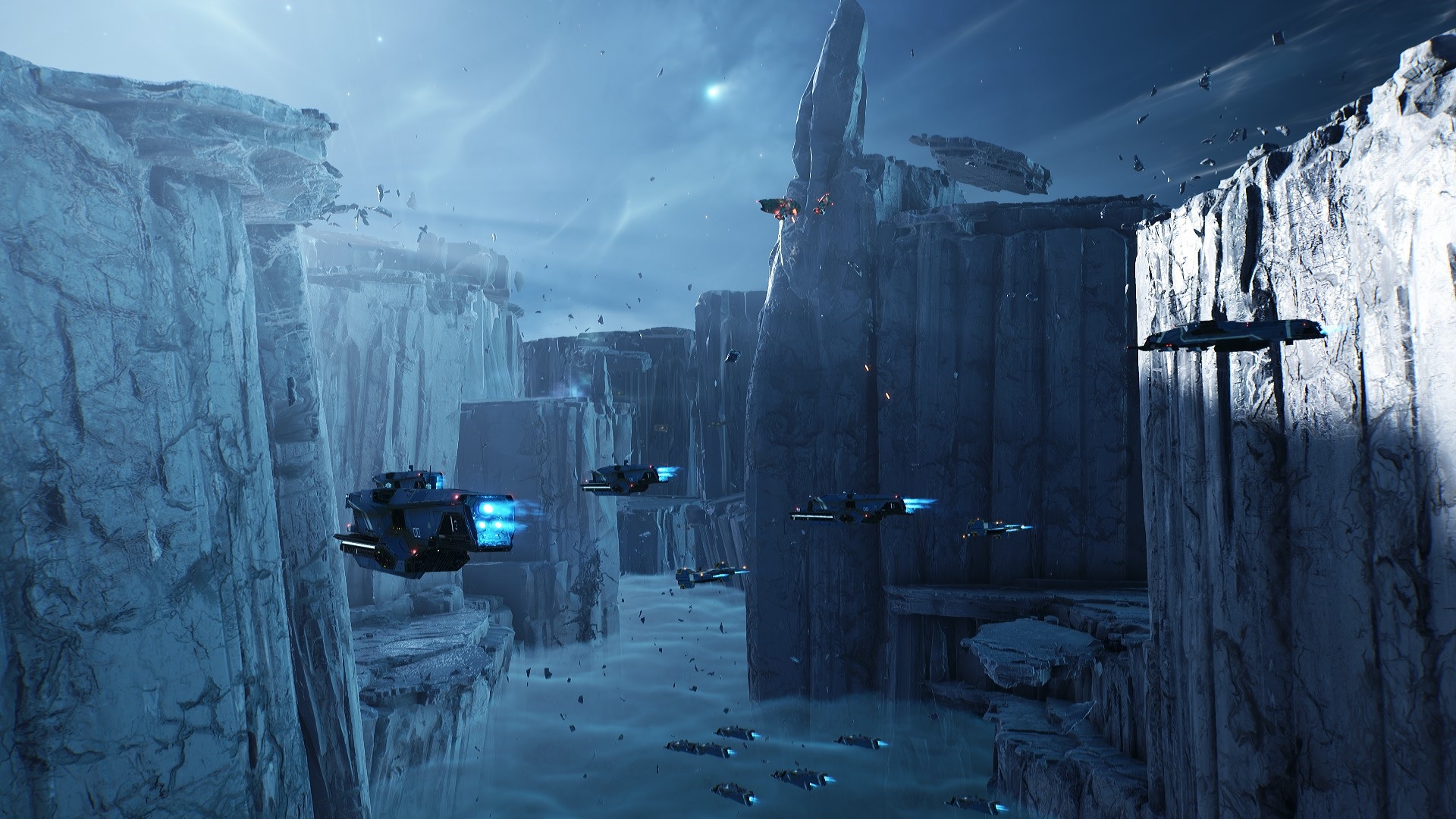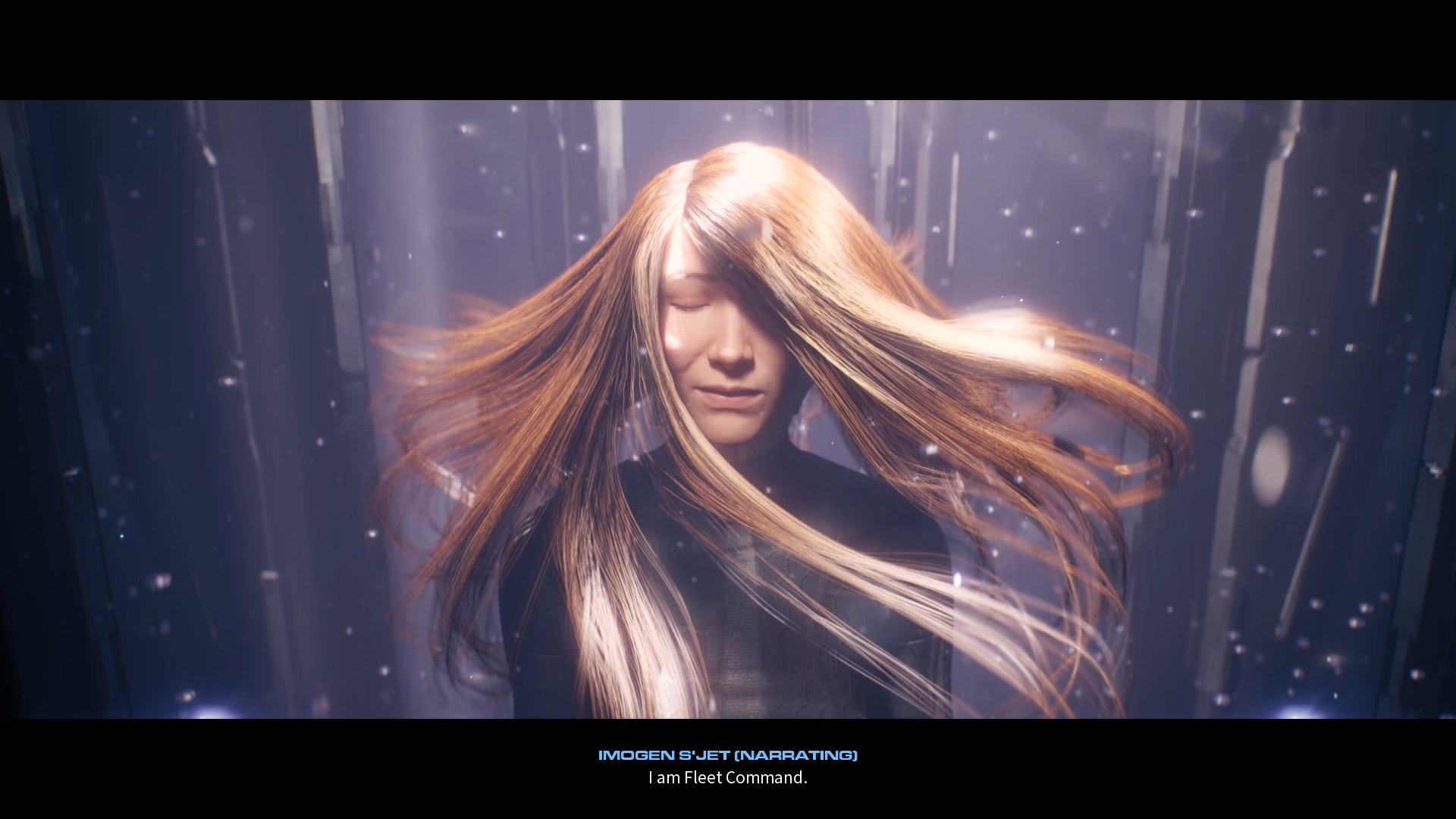
"Even if they win, even if the operation is flawless, someone's not gonna make it home. Because that's just war is like, and how do we craft the person who's like that? How do we give you insight?"
So says Martin Cirulis, lead writer on Homeworld 3, the long-awaited strategy game developed by Blackbird Interactive and published by Gearbox Publishing.
I first spoke with Cirulis last year, where we chatted about how he and others on the team were crafting Homeworld 3's story. Now, in the wake of the game's launch — you can read my review of Homeworld 3 right now — I had the chance to talk with Cirulis again, this time alongside Lin Joyce, managing director of narrative at Gearbox, who worked with Cirulis and others in an editorial role, offering feedback and advice. While the duo touched on a number of topics, we primarily chatted about the characters in Homeworld 3, diving into where they end up and how they get there.
Note that this interview contains spoilers, so if you haven't finished Homeworld 3 yet, I strongly recommend it before reading.

Starting off by diving right into the ending, I asked if leaving Imogen, Isaac, and the Khar-Kushan stranded in the dark reaches of space was always the plan.
"Yeah, and also everybody was kind of on board with that," Cirulis says. "The previous Homeworlds have always brought everything back together from where it started. And for once it was like, 'You know what, let's leave it to an open to a world of adventure for whatever comes after this.' So the Homeworld universe is wide open at this point."
One of the biggest moments in Homeworld 3 comes toward the end, when the Khar-Sajuuk — and by extent, the legendary missing Karan S'Jet — are found embedded in an ice shelf. It's a haunting image, one that feels designed to transfix anyone familiar with the past games. When I asked about how the team approached building this big moment, the pair both credited the cinematics team for really bringing it home.
"They had a vision in their heads on how the ship was gonna be found, how Karan would be found. And me and Lin and the others, we kind of just followed their lead and tried to sharpen that image as much as possible as opposed to get in the way or say stuff or build up plot around it because it was brought to us as a beautiful visual set piece," Cirulis explains, with Joyce adding that the writing team tried to strike a balance of when to speak up or when to be quiet all throughout the game.
"The script refers to using a hammer or a knife in a couple of places, and we tried very hard to be the knife," Cirulis says. When I asked if that was difficult to do at times, he noted that the team had to follow the writer's edict of "murder your babies."
"We wrote things that we just love to death and we're just, you know I love it, Lin loved it, but it doesn't fit, right? Like, someone make notes in case there's a Homeworld movie someday," he says.
"We did write long at first and then you figure out 'What is the kernel that you're really trying to bring through? Let's concentrate it and distill it down until hopefully it isn't a hammer because you don't want that.' But you want it to be the most razor sharp knife," Joyce explains.
"We wrote things that we just love to death and we're just, you know I love it, Lin loved it, but it doesn't fit, right? Like, someone make notes in case there's a Homeworld movie someday.".
Martin Cirulis
A lot of that challenge came down to the nature of the characters. While there's other members of the cast in Homeworld 3, Fleet Command Imogen S'Jet and Intel officer Isaac Paktu dominate most of conversations, with back-and-forth conversations on their goals and struggles in unraveling what is happening in the galaxy.
"I think it works because we were allowed to look at how to really focus on how they foil each other, where they compliment each other and then where their growth arcs would lead each of them in part because of the interaction with the other," Joyce explains. She was particularly involved with writing Imogen, providing suggestions to Martin and the other writers for what the young woman might be feeling in her role.
"So how does Imogen push [Isaac] to grow? And how does Isaac do the same for Imogen when there's not a lot of other characters introducing noise into that again."
For Cirulis, writing Isaac provided an opportunity to "peel back the curtain" on how the Hiigaran military can operate, getting a closer look at the man who feels directly responsible for thousands of lives working off of his information.
"The genre loves to hang on to the cliché that military, they're stoic all the time. Always solid. Never doubting themselves," he says. "It's like...yes, that's how they present themselves to their soldiers because you have to, but behind closed doors, like you don't have to go very far to find a military officer with various mug marks in his wall where when he's by himself."
All of this was specifically meant to build a struggle between how Isaac and Imogen approach their tasks, with the latter's brilliance offset by her inexperience with the harsh realities of combat.

Much of Imogen's struggle in Homeworld 3 comes from her worrying about living up to the example set by Karan S'Jet. Imogen worries she won't be good enough compared to someone people believed was infallible, even though the truth isn't quite so pretty.
"We tried to show that the legend is built of the high points, not the reality. Even Karan herself who is at this point, a saint for all intents and purposes by the public still says 'Hundreds died in seconds because I was gullible.' She was lonely and isolated and trusted something and people died," Cirulis says, adding they wanted to play on the perception of Karan's past, challenging the idea that she would always know the correct choice to make.
"That's what Imogen kinda needed to realize. And that's why Karan shares that with her, which is 'No, none of us are perfect goddesses of iron right out of the package. We all did the best we could, right?' And they're fighting someone who chose not to do the best they could."
Homeworld 3's story is set up as a mystery, with a character-heavy focus that doesn't dole out reveals or meaningful advancements in the plot until the last handful of missions, with the very existence (much less the goals) of the Incarnate Queen being hidden for some time. Cirulis and Joyce both affirm that this was explicitly by design.
"We didn't want to front-load it so that players would've been like, 'Oh yeah, we're going there to defeat that person because that faction does this.' Nope, you are flying by the seat of your pants just like our heroes are," Cirulis says, with Joyce chiming in, "You can't call something the Anomaly and then solve it in the first act."
Homing in on the Incarnate Queen, Cirulis notes that all three of the main women in Homeworld struggle in very different ways with the phrase "Poor me." with the Queen's abandonment as an abused child and lack of being given a choice contrasted with Karan's isolation and burden. Meanwhile, Imogen represents the "pivot" between the two.
"Imogen's like 'I choose my own. I see what's happened to both of you, but I'm choosing my own path,' which is why kind of at the end of the game, she's like 'My people are safe, my ship has one piece and I will suss out the rest tomorrow. Because I will not be drawn into the deadly depths of [being a] control freak.'"
"We tried to show that the legend is built of the high points, not the reality."
Martin Cirulis
With Cirulis and Joyce approaching Homeworld 3 from very different perspectives, I asked if the experience of working on this game has made either of them look at the entirety of the Homeworld franchise in a different light. For Joyce, it comes down to reflecting on the nature of nostalgia and what different games can mean for different people in different times.
"Now we're in a different decade than all of [the prior games], and so you're writing through memory and nostalgia and wanting to honor that," she explains. "Like, what do we think we remember about Homeworld? What do we like about it? What was the kernel that we took forward that fans resonated with and build that up again? Then future cast it as well and just set it in the stars."
As one half of the writing team on the original Homeworld, Cirulis naturally has a different perspective, reflecting on just how far things have come in the last couple of decades, as well as realizing that Homeworld 3 would be enjoyed by both longtime veterans and newcomers alike.
"I think probably the phrase [Lin] used most with me...was reminding me constantly that this was someone's first Homeworld," Cirulis says. "For me, so built in from the very foundations of this thing, I was always like, 'Yeah, no, we'll go in this direction. Everybody knows what we're talking about. Off we go!' And Lin would go, 'Yeah, no, someone picking up this game will have no idea what you're talking about.' It's like '...oh, good point.'"
"When you're writing in a classic universe, you serve the past, the present, you cannot lose sight of the future. And that's something we've tried very, very hard to do," he says, adding that "In all things, in characters and tech and reaction to technology, [the world] has changed utterly in the past 20 years and the Homeworld franchise, I think, is in a really good place to respect its past and live for its present and look towards its future."
That real-world time gap had a direct impact on the decision to utilize an in-universe time skip, per Joyce, with Cirulis adding that the technical readout manual (a free piece of DLC for anyone who buys Homeworld 3) is packed with additional details on how the Homeworld universe has evolved, with documents like Isaac arguing with other members of the Hiigaran military around changing tactics for space combat.

As our time drew to a close, I mentioned to Cirulis that when we last spoke, he said that he wanted players to walk away, thinking that history hinged on the actions of individuals. When I asked if he meant the collective weight of everyone's actions, he happily affirmed the notion, noting that if Imogen had a different Intel officer or if Isaac had a different Fleet Command, everything could've changed.
"I think we have lots of moments where we see that if Imogen or Isaac had been different people, like not as, as "good," the game might still have been won, but with entirely different results," he adds. "And, you know, Lin and I got to craft three aspects of the goddess, right? We have three women characters coming basically from the same initial origin and showing how three different people came at it and came out of it in completely different ways."
"Isaac is pivotal, Imogen is pivotal, and they are individuals. Their life stories and their lives' experience make a difference. Isaac truly believes that the burden has to remain."
Homeworld 3 is currently available on Windows PC via Steam and the Epic Games Store.







